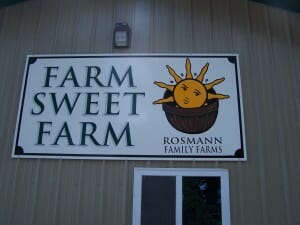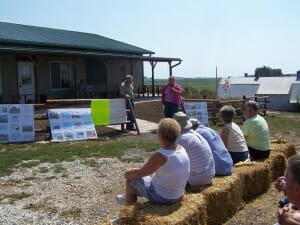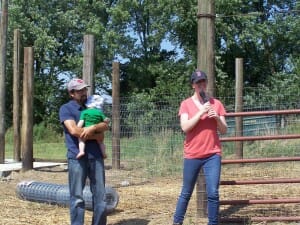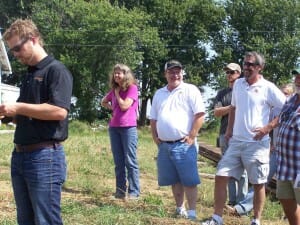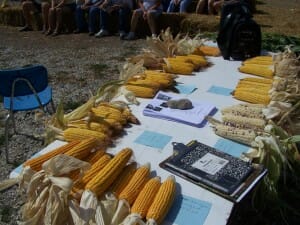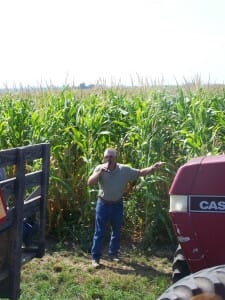Field Day Report- Rosmann Family Farms and Pin Oak Place
Ron and Maria Rosmann have hosted over twenty-some field days at Rosmann Family Farms near Harlan. In addition to the established crops and livestock (corn, soybeans, oats, barley, wheat, popcorn, hay, pasture, beef and swine herd) on the 700-acre family farm, two new enterprises are budding: Farm Sweet Farm and Pin Oak Place. In September, they welcomed 65 people to their farm to talk about enterprises established and new.
Farm Sweet Farm
Farm Sweet Farm recently celebrated a year of being in business. This farm store originated when the farm needed more freezer space. Maria, “The conversation quickly progressed from a simple lean-to storage to ‘Why don’t we build a farm store?'” Maria is the proprietor, selecting product to sell, designing displays, and providing customer service. In addition to products from Rosmann Family Farm, there are products from 17 local businesses. Keg Creek Brewing Company, one of these local businesses, provided samples of their beer during dinner. A commercial kitchen is in progress on the south side of the building. Read more about Farm Sweet Farm on page 6 of this newsletter.
Pin Oak Place
Daniel (son) and Ellen (daughter-in-law) own Pin Oak Place, a specialty crop farm located adjacent to Rosmann Family Farms. Ellen: “When I moved to rural Harlan, there were no local, organic vegetables available. Rural people should have access to healthy food, too.” This year they grew 2.5 acres of vegetables, including garlic, sweet corn, kale, beets, radishes and potatoes. Rosmann Family Farm practices ridge till, and Pin Oak Place is trying to replicate ridge till with their vegetable crops using a Buffalo cultivator.
Ellen and Daniel grew one acre of organic sweet corn (varieties Bling, My Fair Lady, Luscious). The planted at the end of May, and harvested for three weeks in August. Daniel: “We’re happy with what we’ve gotten. There was virtually no insect damage.” Sweet corn competes poorly with weeds, but they were pleased with the weed control in their ridge till system.
Ellen and Daniel participated in a Practical Farmers’ recordkeeping project, in which 13 farms are providing actual production history to create baseline data to improve crop insurance as well as inform lenders and other growers of Iowa yields. They yielded 848.6 8-pound containers on their acre. Farm Service Agency’s Iowa Olympic (conventional) sweet corn average is 471 8-pound containers per acre.
Ellen and Daniel have a neighbor in her nineties who had been supplying the community with eggs for many decades. Ellen said that “Her family wouldn’t let her get more chickens.” Ellen asked if she would mind if Pin Oak Place continued to provide eggs to the community. The neighbor gave her feeders, nesting boxes and customer list to Ellen and Daniel. The laying flock is now around 150 and is made up of four breeds (California White, Gold Star, Barred Rock and Production Red). Chickens are free-range and eggs are certified organic. Daniel explained to attendees how they used telephone poles to construct the fence outside the laying barn, how planks line the bottom of the fence to prevent scratching and keep out predators and how they will construct a lane to the barn in the future.
Like many young farms, Pin Oak Place continues to transform crops and marketing. In 2012, Ellen marketed through a traditional CSA (community supported agriculture) subcription service. In 2013, with baby Xavier in tow, she offered a punch card in lieu of a traditional CSA. Read more about her punch card model in this newsletter article. Pin Oak Place is evaluating crops and markets as they plan for 2014. They are surveying their customers and evaluating market needs in their region to help develop their business.
Rosmann Family Farms
This year 200 acres of the farm is planted in corn, 175 in soybeans, 120 in pasture, 110 in hay and 80 in small grains. Ron practices varying 5-year rotations, but the main rotation on the farm is corn, beans, corn, beans, small grains, hay, hay. Ron expects his corn to be a tremendous crop this year. He is anticipating 175-bushel yield. He plants at a higher seeding rate since his seeds are organic and not treated. “I plant 32,000 to 34,000 seeds always. This year every seed grew.” Ron planted Blue River 54 B36 and Blue River 53 H57 this year. When selecting hybrids, Ron looks for tall plants, broad leaves and strong stocks. “Seeds produced for the region is best, they are better adapted to the area.”
Ron hasn’t purchased nitrogen for his farm since 1982. “This is where diversity pays off. The livestock creates 1000 tons of composted manure each year.” The farm currently raises 30 sows and 85-head grass-fed beef.
Ron “I farmed with pesticides the first ten years of my 40 years farming. I don’t like weeds any more than a conventional farmer. They bug the heck out of me. It’s hard to see them get worse in the past four years, but it’s been tough.” Ragweed is increasingly a problem on the farm. He’s done some research on ragweed in organic systems and done some experimentation, but can’t get ahead of this resilient weed. If anyone has ideas for ragweed research trials, contact Stefan.
Ron started the field day summarizing issues he thinks are core to current and future agricultural endeavors:
1) Climate Change: “All of us realize the weather is changing. It is making it harder to farm.”
2) Soil and water quality and conservation: “Industry says pesticide use has decreased, but the evidence shows it has increased. There are record nitrates in our waters. Are we as good of stewards as we can be?”
3) Diversity: “Loss of habitat and use of harmful chemicals is reducing diversity on many farms.”
Ron dedicated his field day to Dick Thompson. “He was my mentor in ridge till.” Ron said that Dick started every tour on his farm with “I don’t have all the answers, I’m just trying to ask the right questions.” He strived to answer questions on his farm through random, replicated trials.

